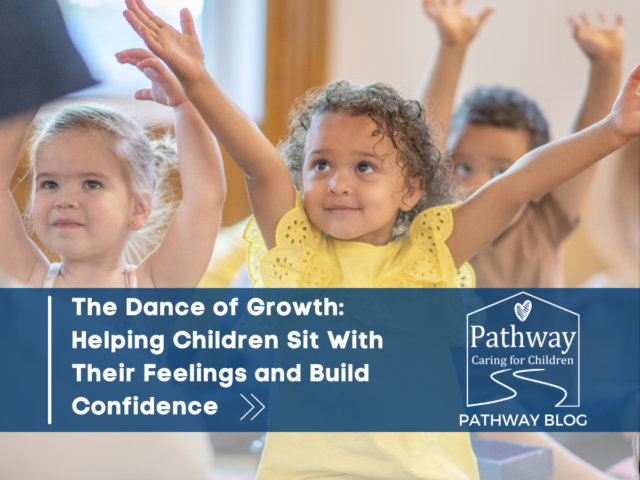
The Dance of Growth: Helping Children Sit With Their Feelings and Build Confidence
Shared from the perspective of Pathway’s Intake Manager.
Last week I sat on pews with other pre-school parents watching 3- and 4-year-olds sing their hearts out. All except one boy. He stood before us, with his classmates who were smiling and singing and doing all the motions-and he cried. For 5 songs he stood facing us and he cried. But his parents smiled, and waved, and gestured lovingly. Not rescuing him-but simply ensuring that he knew they were there, they were proud of him and his effort, and he was supported. Their expressions said “we are proud of you, we believe in you, keep going!”.
As each song was sung-his eyes were locked on those smiling encouraging parents…and his cries went from wails to whimpers to just sniffles. When it was over, his parents doled out the same excitement as the other parents for his performance.
This has been with me over and over again this past week. I wondered how I would have responded if I was his mom.
As caregivers, parents, and especially foster parents, it’s instinctive to want to fix things. When a child faces discomfort, our first response is often to rescue them, to swoop in and eliminate whatever is causing their struggle. Or, sometimes, we swing to the other extreme—expecting them to keep up with their peers and “push through” because that’s what other kids their age can do.
But growth, confidence, and comfort don’t happen overnight. They come through experience, through small victories that build resilience and self-belief. As much as we want to shield our children, we must also allow them the opportunity to see that they can do it. Maybe not today. Maybe not without some initial tears or frustration. But with time, patience, and support, they can persevere and accomplish things they never thought possible.
When We Rescue Too Quickly
When we step in and “fix” the situation for a child, we unintentionally rob them of their chance to grow. Overcoming challenges, even small ones, teaches kids that they are capable, that they can rely on themselves, and that the feeling of discomfort is temporary. A child who successfully navigates a tough moment—no matter how small—walks away with a greater sense of confidence and strength.
When We Expect Too Much
On the other hand, pushing a child to perform before they are ready can backfire. It can send the unspoken message that they are not enough, that their best efforts fall short. For children who have already experienced trauma, loss, or instability, this can be especially damaging. The key is finding the balance—walking alongside them while letting them build their confidence at their own pace.
The Foster Parent’s Role: Meeting Kids Where They Are
As foster parents, you are called to meet your children where they are, not where you expect them to be. This requires patience, empathy, and the understanding that every child’s journey is unique. Sitting with children through their discomfort—whether it’s frustration, sadness, or fear—teaches them an invaluable lesson:
- Feelings are okay.
- You are not alone.
- You are capable of getting through this.
When you stay present, listening and validating their emotions, you provide the safety and support they need to face challenges head-on. Over time, they’ll develop the confidence and skills to tackle life’s hurdles without feeling overwhelmed or unworthy.
Practical Tips for Foster Parents
1. Acknowledge Their Feelings
Say things like, “I know this is really hard for you right now, and it’s okay to feel frustrated. I’m here with you.”
2. Encourage Small Steps
Help them break tasks into smaller, more manageable parts. Celebrate progress, no matter how small.
3. Resist the Urge to Fix
Instead of jumping in immediately, ask, “What do you think we should do next?” This helps them develop problem-solving skills and confidence.
4. Be Patient
Growth takes time. Offer encouragement and reassurance as they work through challenges at their own pace.
5. Model Perseverance
Share your own experiences of working through difficult situations. Kids learn by watching how adults handle challenges.
A Safe Space to Grow
For children who have faced trauma, trust is built when a caregiver shows up consistently. It’s in the quiet moments—sitting with them through big feelings, listening without judgment, and cheering them on as they try again—that they learn they are safe, valued, and capable.
Being a foster parent means walking this dance with grace and intention: allowing kids to feel their discomfort, supporting them through it, and helping them grow stronger on the other side. It’s not easy, but it’s worth it.
Your patience, presence, and love give children a foundation to build resilience, confidence, and hope. You’re not just teaching them to cope—you’re showing them that they belong and that they can face whatever life brings.
For more resources on supporting children’s emotional growth or to learn more about becoming a foster parent, contact Pathway Caring for Children.
Could you be a safe space? The first step to becoming a foster parent is to contact our Recruitment Department. We are here to answer ALL your questions! Call 330-818-0444 or email [email protected] TODAY!
Learn more HERE: https://www.pathwaycfc.org/foster-care/